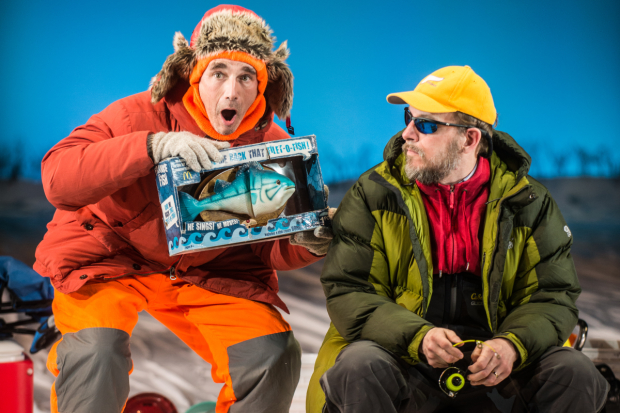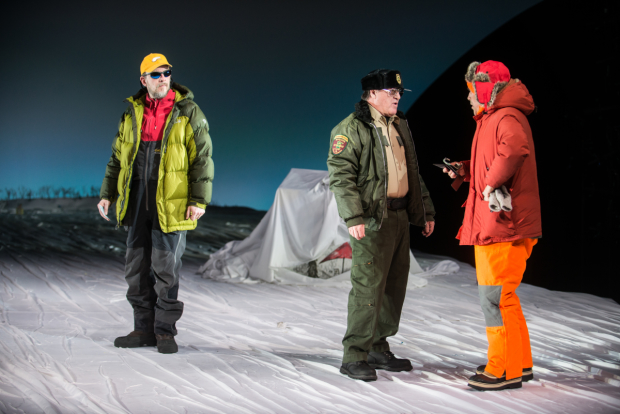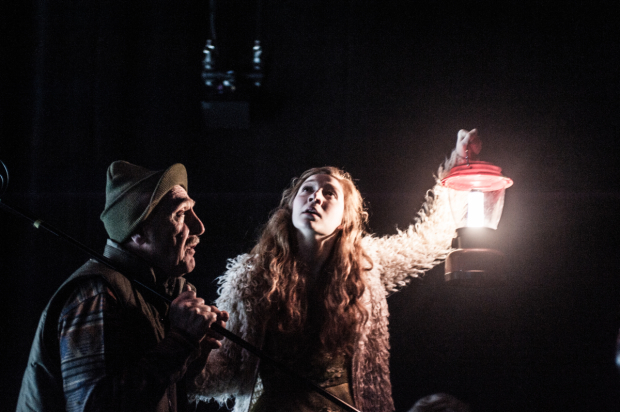Nice Fish

(© Teddy Wolff)
Upon receiving his first two (of three) Tony Awards, Mark Rylance surprised the audience by reciting poems by Duluth-based writer Louis Jenkins: "If you go into the woods, the back country, someplace past all human habitation, it is a good idea to wear orange and carry a gun, or, depending on the season, carry a fishing pole, or a camera with a big lens," went the first one in 2008 (taken from Jenkins' "Backcountry"). That line makes it into Nice Fish, the new play Rylance co-authored with Jenkins, which is now making its New York debut at St. Ann's Warehouse after earlier productions at Minneapolis' Guthrie Theater and A.R.T. in Cambridge. Sure enough, Rylance (who also stars) wears orange and carries a fishing pole.
Jenkins' prose poems are an idiosyncratic blend of comedy and wonder (tinged with sadness). They certainly make a welcome respite from the usual laundry list of acknowledgments that accompany the acceptance of an award. As a full-length theatrical experience, however, these pithy observations delivered in a quirky manner quickly become tedious, causing us to think less about the mysteries of this American life and more about our unwashed laundry.

(© Teddy Wolff)
The show takes place on a frozen lake in Minnesota. Erik (Jim Lichtscheidl) and Ron (Rylance) sit on the ice in huge down coats, surrounded by fishing equipment. Vladimir and Estragon-like, they exchange non-sequiturs until they are interrupted by an overzealous officer of the Department of Natural Resources (Bob Davis expertly playing a bureaucrat in aviator sunglasses). He threatens them with fines and regulations until they pay $34 for stamps and licenses. They meet Flo (Kayli Carter), a neighbor girl with a sauna in her ice shelter. Her grandfather, Wayne (an appropriately grizzled Raye Birk), is a spear fisherman; he considers himself more a "hunter" than the effete lure fishermen who frequent the lake. The five upper Midwesterners ruminate about life via Jenkins' poetry for 95 minutes, a time that is marked by innovative theatrical convention as well as some well-worn tropes.
Director Claire van Kampen (married to Rylance) has crafted a whimsical production: Todd Rosenthal's scenery is reminiscent of a giant train set, the kind you might see at the Bronx Botanical Garden around the holidays. Upstage, miniature ice shelters rest on a wrinkled sheet representing snow banks as Rylance and Lichtscheidl occupy the foreground of this very forced perspective (Flo appears as a Bunraku puppet when standing outside her tiny ice shelter). Lighting designer Japhy Weideman and sound designer Scott W. Edwards create realistic winter weather conditions, including a somewhat soothing thunderstorm. It feels very much like visiting the planetarium.
But instead of the sonorous baritone of Neil deGrasse Tyson describing dark matter, we hear Rylance's somewhat pinched tenor explain how the residents of Sitka deal with the precarious lifecycle of sea lions: "Every sea lion is named Earl because they are killed one after another by the orca, the killer whale; bodies tossed left and right into the air. 'At least he didn't get Earl,' someone says." His childlike delivery doesn't vary markedly from that of his Tony speeches, but Rylance is one of those actors who can read the phonebook and make it (inexplicably) funny. Lichtscheidl adroitly plays the straight man to Rylance's clown, but we never really gain a deeper understanding of either man beyond their prescribed roles in the commedia food chain.

(© Teddy Wolff)
Granted, the play has a more modern stock character in Flo, a Minnesotan version of a manic pixie dream girl. Costume designer Ilona Somogyi dresses her up in Zooey Deschanel realness: a rainbow ski cap, Dr. Seuss socks, and a lacy green dress. On top of that, she dons an oversized blazer and man's hat. "I've decided that it would be nice to be someone else for a change. I call myself art," she says, waving around a smoking pipe. Naturally, she's also a folk singer (the cast harmonizes beautifully on their one number). Carter delivers all her lines with breathy wonder, something that feels appropriate for the text, but also becomes monotonous. "Do either of you guys want to try the sauna," she smilingly offers the middle-aged men for perhaps the third time, causing us to cringe.
Furtive sexual politics aside, there's an unexpected beauty in Jenkins' seemingly banal prose poetry: Themes of life and death weave effortlessly through pithy anecdotes about starfish and Swedish family reunions. Unfortunately, the dreamy, meditative tone of Nice Fish is more likely to lull you into a gentle slumber than cause your ears to perk up in recognition of an artfully phrased truth. The well-executed stagecraft seems more decorative than actively illustrative. It's easy to walk away with an appreciation of Jenkins' work, just not necessarily its presentation onstage.











